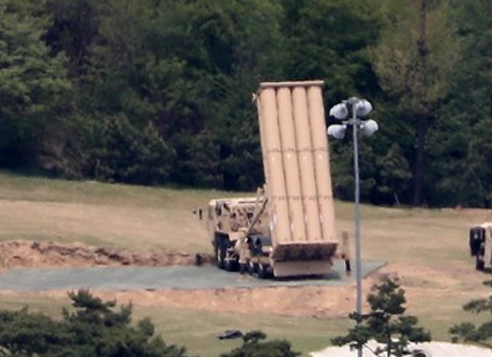WASHINGTON -- The deployment of the THAAD missile defense system in South Korea could raise cost-sharing questions in the United States despite Washington's agreement to pay for it, a congressional report has said.
The Congressional Research Service report, dated April 4, came a few weeks before US President Donald Trump began demanding that South Korea pay for THAAD because it's designed to protect the country from North Korean threats.
That shows that Trump's demand is not an isolated view and many others may also consider it unfair for the US to fully shoulder THAAD's cost despite the deployment deal that commits the US to pay for the system, while the South agrees to host it and provides land.
 |
(Yonhap) |
"The land was provided by South Korea, but the United States will pay for the system and its operation. According to press reports, estimated costs for the system range from $800 million to $1.6 billion. South Korean Defense Minister Han Min-koo has stated that South Korea will not bear any of the costs associated with THAAD," the CRS report said.
"Although officials in the Trump administration have voiced strong support for the deployment, including Secretary of Defense Mattis, some analysts speculate that this development could prompt new questions about cost-sharing in providing for South Korea's defense," it said.
The report also said that defense cost-sharing, together with the US trade deficit with the South, will play a large role in the overall relations between the US and the South as the Trump administration is expected to demand more from the South.
"Such pressure could come during negotiations over renewing the cost-sharing Special Measures Agreement that are due to begin in 2017," the report said, pointing out that even after inauguration, Trump has urged all US allies, including those in the Pacific, to "pay their fare share of the cost."
The report also said that the Trump administration is expected to increase economic pressure on South Korea in the future as it has highlighted the US has run a deficit in trade in goods with the South since the free trade agreement between the two countries went into effect in 2012 and has stated its intent to re-examine and potentially renegotiate existing FTAs.
With regard to cooperation in North Korea policy, the report said that tensions could rise between the two countries over how to deal with Pyongyang if Moon Jae-in, the front-runner in South Korea's presidential race, is elected.
"The front-runner in the presidential race, Moon Jae-in, has pledged to visit North Korea as president, as well as to reopen and expand the Kaesong Industrial Complex, an inter-Korean industrial park located in North Korea that (former President Park Geun-hye) shut down in 2016 to increase pressure on Pyongyang," the report said.
The factory park provided the North Korean government with access to a stream of hard currency, estimated to be worth over $500 million in total when the complex was open from 2004-2016, the report said. Reopening the complex may violate United Nations sanctions, it said.
"If Moon is elected, many analysts expect tensions with the United States over the best approach to North Korea to rise, especially if the Trump administration or Congress toughen US policy, as many observers anticipate may be the case," it said. (Yonhap)






![[Exclusive] Hyundai Mobis eyes closer ties with BYD](http://res.heraldm.com/phpwas/restmb_idxmake.php?idx=644&simg=/content/image/2024/11/25/20241125050044_0.jpg)
![[Herald Interview] 'Trump will use tariffs as first line of defense for American manufacturing'](http://res.heraldm.com/phpwas/restmb_idxmake.php?idx=644&simg=/content/image/2024/11/26/20241126050017_0.jpg)
![[Herald Review] 'Gangnam B-Side' combines social realism with masterful suspense, performance](http://res.heraldm.com/phpwas/restmb_idxmake.php?idx=644&simg=/content/image/2024/11/25/20241125050072_0.jpg)